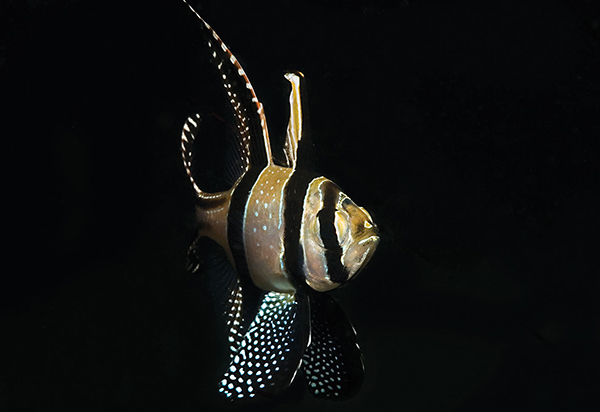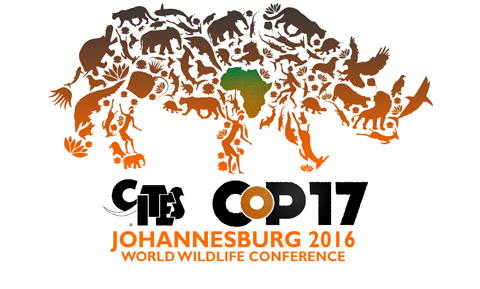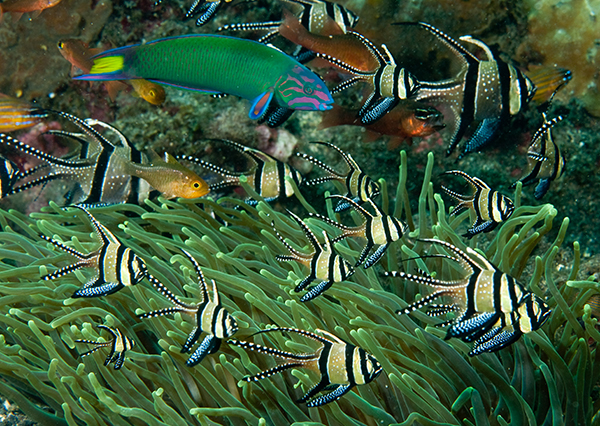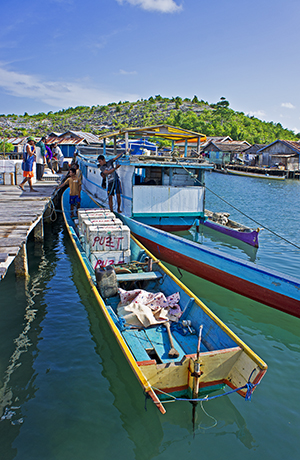
The dazzling Banggai Cardinalfish still poses a dilemma for those who follow its populations in a remote archipelago in Indonesia. Image: Colin Foord.
A New Chapter for Indonesia and the Pterapogon kauderni fishery?
by Ret Talbot
originally published Oct. 5, 2016, via the Good Catch Blog
Over the past several days, I have been reporting on the 17th meeting of the Conference of the Parties (CoP17) to the Convention on International Trade in Endangered Species of Wild Fauna and Flora (CITES). My focus has been primarily on the marine species proposed for regulation under CITES with an emphasis on the Banggai Cardinalfish, a species I have covered extensively here and elsewhere. Now that CoP17 is over, a new chapter begins for the Banggai Cardinalfish, and the following is really the beginning of that story.
On Monday, the European Union withdrew its proposal to list the Banggai Cardinalfish (Pterapogon kauderni) under CITES Appendix II.
The withdrawal occurred following Indonesia’s acceptance of a series of draft decisions, which are outlined below. On Tuesday, during the CoP17 plenary session, the withdrawal and the draft decisions were officially adopted (see video above), beginning another chance for Indonesia (and the aquarium trade) to put in place effective reforms for conservation and sustainable harvest of the species.
Species included on Appendix II are those that, although currently not threatened with extinction, may become so without trade controls. The inclusion of the Banggai Cardinalfish on Appendix II was supported by the CITES Secretariat, as well as the Food and Agriculture Organization of the United Nations (FAO), the United States and numerous other Parties, NGOs and observers who believe the Banggai Cardinalfish meets the criteria for inclusion.
The proposal was opposed by Indonesia, the only range state for the species, as well as by the Lao People’s Democratic Republic (Laos) and Kuwait. Aquarium trade associations also generally opposed the proposal, although Ornamental Fish International (OFI), which had a representative present at CoP17, said “we are open to possible new information that could emerge during the CoP.”

CITES is the Convention on International Trade in Endangered Species of Wild Fauna and Flora and organisms listed are subject to many trade and possession restrictions. A listing for the Banggai Cardinalfish could have led to a ban on its import into the EU.
Of the 62 proposals considered at CoP17, only six, including the proposal to include the Banggai Cardinalfish, were withdrawn.
The final adopted draft decisions agreed to by Indonesia are as follows:
Directed to Indonesia
- 17.X1 Indonesia should implement conservation and management measures to ensure the sustainability of international trade in Pterapogon kauderni, and report progress on these measures to the Animals Committee at its 30th meeting (possibly in mid-2018).
Directed to the Secretariat
- 17.X2 Subject to external funding, the Secretariat shall commission a study to assess the impact of international trade on the conservation status of Pterapogon kauderni and to advise on suitable conservation and management measures, as appropriate.
- 17.X3 The Secretariat shall share the results of the study as referred to under decision 17.X2 with the Animals Committee at its 30th meeting.
Fishing dock in the Banggai Islands where the Indonesian government has struggled to enforce fishery regulations. Image: Ret Talbot.
Directed to the Animal Committee
- 17.X4 The Animals Committee shall, at its 30th meeting, review the progress report submitted by Indonesia as referred to under Decision 17.X1, as well as the results of the study as referred to under Decision 17.X2, and make its recommendations to the 18th meeting of the Conference of the Parties.
Directed to donor Parties and other relevant organizations
- 17.X5 Donor Parties and other relevant organizations, including FAO, are invited and encouraged to provide support to Indonesia and to the Secretariat for the purpose of implementing Decisions 17.X1 to 17.X3.
The 30th meeting of the CITES Animals Committee will likely be held during the spring or summer of 2018. The role of the Animals Committee is to provide technical support to decision-making regarding species of animals that are subject to CITES trade controls. The members of the Animals Committee represent the six major geographical regions (Africa, Asia, Europe, North America, Central and South America and the Caribbean, and Oceania) as well as one specialist on nomenclature. Members are elected at the CoP, with the number of regional representatives weighted according to the number of member nations or “parties” within each region and according to the regional distribution of biodiversity. COP18 will be held in 2019 in Sri Lanka.
Mixed Reactions to Decision
In a statement posted to its Facebook page, OFI praised the EU’s decision to withdraw its proposal to include the Banggai Cardinalfish on Appendix II and instead to propose the draft decisions listed above.
OFI…wholeheartedly supports the agreement that was adopted yesterday; to give Indonesia the possibility to implement conservation and management measures, with the support of the CITES Secretariat, Parties and organisations, including the FAO, in the time leading up to the 30th meeting of the CITES Animals Committee.
Svein A. Fosså, an aquarium and pet trade consultant who represented OFI at CoP17 and who is also a longstanding observer in Animals Committee meetings, was pleased with the EU’s action and the draft decisions, saying “We could hardly have expected a better outcome, for the species, for the trade and for the livelihoods in Indonesia.”
It should be noted that many in favor of the withdrawal also note the precarious nature of the species’ conservation status and even acknowledge, as the FAO does, that it meets the criteria for inclusion on Appendix II. Nonetheless, they feel a listing was not the right path forward and that the draft decisions listed above are a much better outcome than forcing a CITES listing on the only range country despite its strenuous opposition.

Wild Pterapogon kauderni: Aquarists now can choose between captive bred and wild-collected Banggai Cardinalfish, the latter usually a lower prices. Image: Shutterstock.
Not everyone was as optimistic though.
“I would say that the fact that in eight years there has not been significant improvements to stocks makes me wonder about the ability for us to help this species recover [without a CITES listing],” says Michael Tlusty of the New England Aquarium in Boston. Tlusty’s project to better monitor the aquarium trade is a winner in this year’s Wildlife Tech Challenge. “Are we preserving the status quo, or will the call for more effort and data to understand this species actually move the needle towards improvement?” Tlusty’s concerns are concerns that were also expressed by the US delegate in support of the EU proposal to grant the Banggai Cardinalfish CITES protection. As the US delegate made clear prior to the EU withdrawing its proposal, Indonesia’s efforts to better manage the species to date have proven largely ineffective.
During CoP14 in 2007, the US withdrew its own proposal to include the Banggai Cardinalfish on Appendix II, citing Indonesia’s renewed commitment at that time to better managing the trade in the species. “At that time, we were convinced that the national conservation management plan presented by Indonesia would help stem the decline of this species,” the US delegate said on Monday. “However, since then, the national conservation measures seem to be insufficient, and CITES regulation would compliment the measures that are in place by Indonesia.”
The US delegate went on to note that in the intervening years since the US withdrew its own proposal in 2007, the conservation status of the Banggai Cardinalfish under Indonesia’s management has not improved. “We would note that the FAO Expert Advisory Panel…since the first evaluation, has found now that local extinction has occurred at five sites across the Banggai Archipelago with an additional seven sites where there are declines in abundance.” [View the full intervention by the US in support of the EU proposal in the video below.]
While they may differ in their degree of optimism, both Fosså and Tlusty are hopeful that the draft decisions put in place at CoP14 will indeed move the needle in terms of the conservation status of the species. Although we likely won’t know the results until the Animals Committee reviews the progress report submitted by Indonesia, as well as the results of the study commissioned by the Secretariat regarding the conservation status of the species, there is some comfort in the fact that there is now at least an international framework with set deadlines in place. Perhaps it will insure that we don’t see a hat trick at CoP18 insofar as withdrawals of Banggai Cardinalfish proposals are concerned.
CORRECTION: An earlier draft of this entry said Svein A. Fosså sits on the Animals Committee. Fosså is an observer in Animals Committee meetings, but not a formal member. He intends to be present at AC30.






Trackbacks/Pingbacks